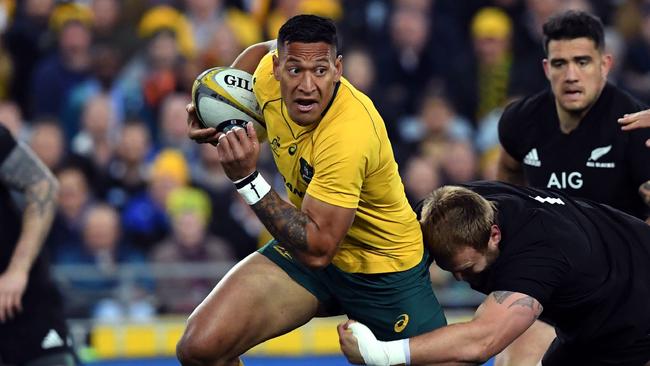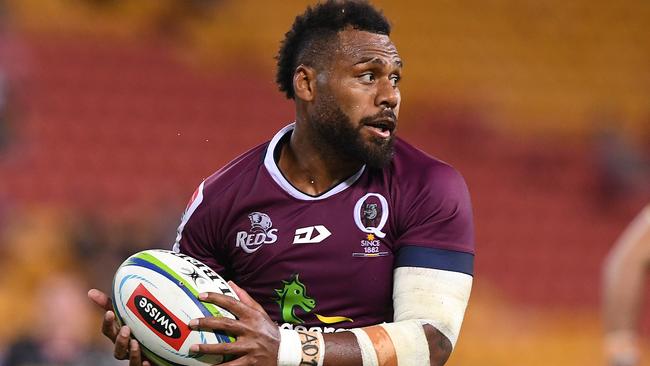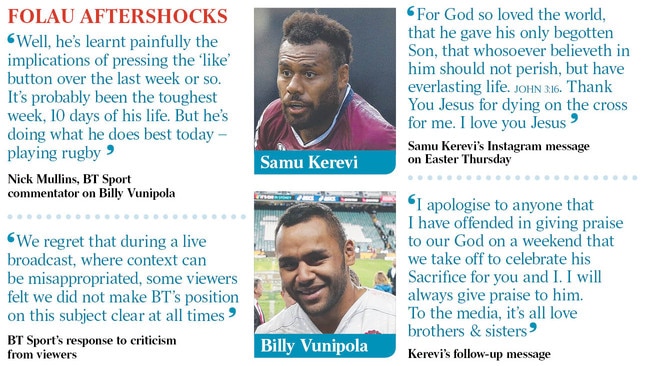Rugby Australia won’t let Israel Folau play, even if he wins hearing
A rugby star apologises for an Easter “I love Jesus’’ message ahead of the hearing into Israel Folau.

Rugby Australia almost certainly would appeal if the Code of Conduct hearing into Israel Folau decides he has done nothing worthy of termination, as the issue that has polarised not just the code but the wider community shows no signs of ending.
Folau will face the Code of Conduct tribunal in Sydney on Saturday, with Sunday set aside for further deliberations if necessary. Despite Rugby Australia’s best attempts to corral this issue to an employment dispute, it has taken on far wider significance, with commentators yesterday describing Folau as “a test case for the tolerance of discrimination against Christians in Australia”.
The controversy has reached out and ensnared rugby players around the globe.
Queensland captain Samu Kerevi needed only to post a biblical message on Easter Thursday praising God to prompt an adverse response from some readers.
“For God so loved the world, that he gave his only begotten Son, that whosoever believeth in him should not perish, but have everlasting life,” he wrote on Instagram, a passage from John 3:16 “Thank You Jesus for dying on the cross for me. I love you Jesus”

In turn, he then issued an apology to “anyone that I have offended in giving praise to our God on a weekend that we take off to celebrate his sacrifice for you and I”.
And when England and Saracens No 8 Billy Vunipola won a man-of-the-match award against Munster shortly after he had “liked” Folau’s original post and then posted an article on Instagram in support, BT Sport’s Nick Mullins, the television commentator who made sympathetic comments about him, was himself subjected to criticism from some viewers.
“Well, he’s learnt painfully the implications of pressing the ‘like’ button over the last week or so,” Mullins said during the call.
BT Sports was forced to issue a clarifying statement in which it stressed it did “not accept any sort of discrimination”.

Folau’s case will rest on two principal arguments — that the post was not in his own words and that Rugby Australia did not insert a specific social media clause in the $4 million, four-year contract he signed last October.
RA would still argue that its Code of Conduct gives it the right to fire the three-times John Eales medallist and certainly its chief executive Raelene Castle could be forgiven for not inserting a special “social media clause” after she had accepted Folau’s assurances in April last year that he would do nothing to cause offence again. Still, whatever the reasons, there was no such clause in the contract he signed.
It is also likely Folau’s defence will from the outset attempt to have the charge against him recategorised from a “high level” breach to either a medium or low-level breach. It would be more than mere legal manoeuvring. Only a high level breach carries with it the ultimate sanction of termination.
In the final analysis, Folau is not fighting to continue his rugby career in this country. Rugby Australia has made it quite clear that whether he wins the case or loses it, his time with the Wallabies and Waratahs is over. Effectively, the Code of Conduct hearing is about whether RA can send him on his way empty-handed or whether it must negotiate to pay him some or all of the $4 million.
Sources have revealed to The Australian that RA almost certainly would appeal if the Code of Conduct tribunal returns any verdict that precludes termination. The losing party has 72 hours from the start of the Code of Conduct hearing to lodge an appeal. They may appeal because of an error of law; that the decision was unreasonable or insupportable having regard to the evidence on which it was based; and/or that the penalty imposed was manifestly inadequate or unjust. Certainly “proportionality” — fitting the punishment to the “crime” — is looming as a vital component of the hearing, with Folau’s supporters adamant that he has done nothing wrong.
The appeal would be heard by a reconstituted Appeal Tribunal made up of entirely different members from the original panel. Once RA’s legal system has run its course, it would be possible for Folau or the organisation to take the matter to the courts.
That raises the interesting question of whether Folau would attempt to restart his rugby career, either with his designated club, Sydney University, or with his brother John’s club, the Western Sydney Two Blues.



To join the conversation, please log in. Don't have an account? Register
Join the conversation, you are commenting as Logout